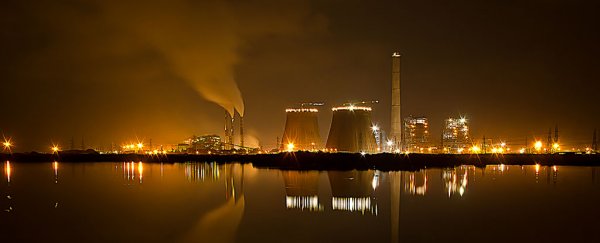A chemical plant in India is the first in the world to run a new system for capturing carbon emissions and converting them into baking soda.
The Tuticorin Alkali Chemicals plant, in the industrial port city of Tuticorin, is expecting to convert some 60,000 tonnes of CO2 emissions annually into baking soda and other chemicals – and the scientists behind the process say the technique could be used to ultimately capture and transform up to 10 percent of global emissions from coal.
While carbon capture technology is not a new thing, what's remarkable about the Tuticorin installation is that it's running without subsidies from the government – suggesting the researchers have developed a profitable, practical system that could have the commercial potential to expand to other plants and industries.
"I am a businessman. I never thought about saving the planet," the managing director of the plant, Ramachadran Gopalan, told the BBC.
"I needed a reliable stream of CO2, and this was the best way of getting it."
The inventors of the new technique, London-based Carbon Clean Solutions, developed the system in the UK after receiving finance from a British entrepreneur support scheme. Their process uses a patented chemical to filter out CO2 molecules.
In the Tuticorin setup, the plant runs a coal-fired burner to make steam that powers its various chemical-manufacturing processes. A mist containing Carbon Clean's chemical separates the CO2 emissions in the burner's chimney, which are then fed into a mixing chamber with salt and ammonia.
The end product can then be used to produce baking soda (sodium bicarbonate) or a range of other compounds, for use in things such as glass manufacture, detergents, disinfectants, and sweeteners.
The overall idea of separating CO2 molecules from flue gas may not be new, but the team behind the system say that their filtering chemical is more efficient than the amine compounds that scientists have previously used, and requires less energy to run.
According to CEO Aniruddha Sharma, the company's approach is to think realistically, partnering with modest, low-risk enterprises as it builds itself up – and he says the same strategy should be implemented by the carbon capture industry as a whole.
"So far the ideas for carbon capture have mostly looked at big projects, and the risk is so high they are very expensive to finance," Sharma told Roger Harrabin at The Guardian.
"We want to set up small-scale plants that de-risk the technology by making it a completely normal commercial option."
The other compelling aspect of the system is that it actually does something positive with the carbon – making new chemicals and products – rather than simply storing it somewhere in a useless, dormant state (such as burying it underground).
That distinction is the difference between carbon capture and storage (CCS) and what's called carbon capture and utilisation (CCU).
And given the expense involved with building carbon capture systems, the ability to on-sell a byproduct could be incredibly important in making this technology financially viable in the bigger picture.
"We have to do everything we can to reduce the harmful effects of burning fossil fuels," Lord Ronald Oxburgh, the head of the UK government's carbon capture advisory group, told the BBC, "and it is great news that more ways are being found of turning at least some of the CO2 into useful products."
